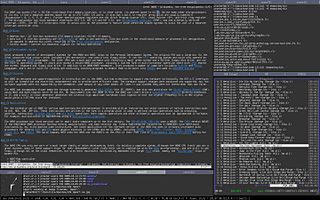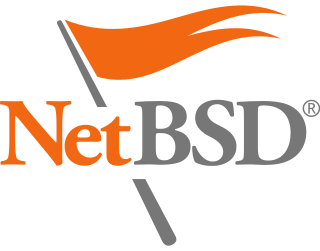
The Common Desktop Environment (CDE) is a desktop environment for Unix and OpenVMS, based on the Motif widget toolkit. It was part of the UNIX 98 Workstation Product Standard, and was for a long time the Unix desktop associated with commercial Unix workstations. It helped to influence early implementations of successor projects such as KDE and GNOME desktop environment, which largely replaced CDE following the turn of the century.

Solaris is a proprietary Unix operating system originally developed by Sun Microsystems. After the Sun acquisition by Oracle in 2010, it was renamed Oracle Solaris.

Portage is a package management system originally created for and used by Gentoo Linux and also by ChromeOS, Calculate, Sabayon, and Funtoo Linux among others. Portage is based on the concept of ports collections. Gentoo is sometimes referred to as a meta-distribution due to the extreme flexibility of Portage, which makes it operating-system-independent. The Gentoo/Alt project was concerned with using Portage to manage other operating systems, such as BSDs, macOS and Solaris. The most notable of these implementations is the Gentoo/FreeBSD project.

In Unix computing, Ion is a tiling and tabbing window manager for the X Window System. It is designed such that it is possible to manage windows using only a keyboard, without needing a mouse. It is the successor of PWM and is written by the same author, Tuomo Valkonen. Since the first release of Ion in the summer 2000, similar alternative window management ideas have begun to show in other new window managers: Larswm, ratpoison, StumpWM, wmii, xmonad and dwm.

OpenSolaris is a discontinued open-source computer operating system based on Solaris and created by Sun Microsystems. It was also, perhaps confusingly, the name of a project initiated by Sun to build a developer and user community around the eponymous operating system software.
OS-level virtualization is an operating system (OS) virtualization paradigm in which the kernel allows the existence of multiple isolated user space instances, called containers, zones, virtual private servers (OpenVZ), partitions, virtual environments (VEs), virtual kernels, or jails. Such instances may look like real computers from the point of view of programs running in them. A computer program running on an ordinary operating system can see all resources of that computer. However, programs running inside of a container can only see the container's contents and devices assigned to the container.
BioLinux is a term used in a variety of projects involved in making access to bioinformatics software on a Linux platform easier using one or more of the following methods:
Ports collections are the sets of makefiles and patches provided by the BSD-based operating systems, FreeBSD, NetBSD, and OpenBSD, as a simple method of installing software or creating binary packages. They are usually the base of a package management system, with ports handling package creation and additional tools managing package removal, upgrade, and other tasks. In addition to the BSDs, a few Linux distributions have implemented similar infrastructure, including Gentoo's Portage, Arch's Arch Build System (ABS), CRUX's Ports and Void Linux's Templates.
The FreeBSD Ports collection is a package management system for the FreeBSD operating system. As of February 2020, there are over 38,487 ports available in the collection. It has also been adopted by NetBSD as the basis of its pkgsrc system.

FreeBSD is a free and open-source Unix-like operating system descended from the Berkeley Software Distribution (BSD). The first version of FreeBSD was released in 1993 developed from 386BSD and the current version runs on x86, ARM, PowerPC and RISC-V processors. The project is supported and promoted by the FreeBSD Foundation.

Kernel-based Virtual Machine (KVM) is a free and open-source virtualization module in the Linux kernel that allows the kernel to function as a hypervisor. It was merged into the mainline Linux kernel in version 2.6.20, which was released on February 5, 2007. KVM requires a processor with hardware virtualization extensions, such as Intel VT or AMD-V. KVM has also been ported to other operating systems such as FreeBSD and illumos in the form of loadable kernel modules.
GNU variants are operating systems based upon the GNU operating system. According to the GNU project and others, these also include most operating systems using the Linux kernel and a few others using BSD-based kernels.
.pkg (package) is a filename extension used for several file formats that contain packages of software and other files to be installed onto a certain device, operating system, or filesystem, such as the macOS, iOS, PlayStation Vita, PlayStation 3, and PlayStation 4.
The Image Packaging System, also known as IPS or pkg(5), is a cross-platform package management system created by the OpenSolaris community in coordination with Sun Microsystems. It is used by Solaris 11 and several Illumos-based distributions: OpenIndiana, OmniOS, XStreamOS and a growing number of layered applications, including GlassFish, across a variety of Operating System platforms. IPS is coded in the Python programming language.

Illumos is a partly free and open-source Unix operating system. It is based on OpenSolaris, which was based on System V Release 4 (SVR4) and the Berkeley Software Distribution (BSD). Illumos comprises a kernel, device drivers, system libraries, and utility software for system administration. This core is now the base for many different open-sourced Illumos distributions, in a similar way in which the Linux kernel is used in different Linux distributions.

OpenIndiana is a free and open-source illumos distribution descended from UNIX System V Release 4 via the OpenSolaris operating system. Forked from OpenSolaris after OpenSolaris was discontinued by Oracle Corporation, OpenIndiana takes its name from Project Indiana, the internal codename for OpenSolaris at Sun Microsystems before Oracle’s acquisition of Sun in 2010.

NetBSD is a free and open-source Unix operating system based on the Berkeley Software Distribution (BSD). It was the first open-source BSD descendant officially released after 386BSD was forked. It continues to be actively developed and is available for many platforms, including servers, desktops, handheld devices, and embedded systems.

SmartOS is a free and open-source SVR4 hypervisor based on the UNIX operating system that combines OpenSolaris technology with bhyve and KVM virtualization. Its core kernel contributes to the illumos project. It features several technologies: Crossbow, DTrace, bhyve, KVM, ZFS, and Zones. Unlike other illumos distributions, SmartOS employs NetBSD pkgsrc package management. SmartOS is designed to be particularly suitable for building clouds and generating appliances. It was originally developed for and by Joyent, who announced in April 2022 that they had sold their business supporting and developing of Triton Datacenter and SmartOS to MNX Solutions. It is open-source and free for anyone to use.

OpenZFS is an open-source implementation of the ZFS file system and volume manager initially developed by Sun Microsystems for the Solaris operating system and now maintained by the OpenZFS Project. It supports features like data compression, data deduplication, copy-on-write clones, snapshots, and RAID-Z. It also supports the creation of virtual devices, which allows for the creation of file systems that span multiple disks.












